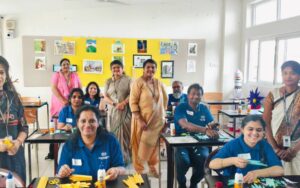Benefits of Extracurricular Activities for Kids
Isn’t the academic curriculum stressful? Do children drain out after a long day of school? Then what can cheer them up and distract them from academics? A few activities can brighten children’s moods and bring calmness. Over the years, these out-of-syllabus activities have enhanced academic excellence and created a positive learning experience. This blog highlights the impact of extracurricular activities and their long-term effect on kids’ futures.
What are Extracurricular Activities?
Extracurricular activities, also known as co-curricular activities, are the programs outside of the school syllabus. They can range from sports to community service.
The skills learnt in the academic coursework can be applied in extracurricular activities. They offer students an opportunity to reveal different aspects of their personality. It acts as a window to showcase their talents and hobbies.
Key Benefits of Extracurricular Activities
Boosts Academic Performance
Research has revealed that children engaged in extracurricular activities have better exam scores. It improves their grasping power and focus. It cultivates time management skills and discipline.Develops Social Skills
Activities like sports instill teamwork and communication skills. Extracurriculars provide opportunities for kids to interact with peers and build social connections. They are a great way to learn important social skills like leadership and organizational capabilities.Encourages Time Management
Kids learn to balance academic and extracurricular activities, thereby inculcating time management skills. This essential skill also helps in personal growth and is a strong personality trait.Builds Confidence and Self-Esteem
Activities like extempore and debate build confidence and self-esteem among kids. Success in these activities boosts self-worth and encourages them to pursue them for a lifetime.Promotes Physical and Mental Well-being
Physical activities like swimming, badminton, clay moulding, pottery, yoga, etc. promote physical fitness along with fostering creativity. On the other hand, social activities like volunteering, sightseeing, etc. promote mental wellness.
Types of Extracurricular Activities for Kids
There are a wide range of extracurricular activities catering to children of different age groups, skills, and interests.
Sports and Physical Activities
There are numerous sports that a kid can choose from, namely: Tennis, Cricket, Football, Volleyball, Swimming, Shot Put, etc. Other physical activities include yoga, gymnastics, aerobics, dance fitness, and exercises. The main goal of these activities is to increase the body’s metabolism and maintain physical fitness. They instill social, cognitive, and important life skills.
Creative Arts and Music
Creative art activities can be dance, drawing, painting, music, pottery, drama, storytelling, bead jewelry, puppetry, clay molding, etc.These extracurricular activities build imagination and self-esteem. They foster cognitive and emotional development. Children develop fine motor skills and learn social skills.
Academic Clubs and Competitions
Engaging in clubs like debate and math or science fuels academic interests. They build curiosity and foster problem-solving and critical thinking skills.Clubs and competitions provide students with an opportunity to explore their interests and assess their capabilities. Participating in these activities is essential to form peer connections and build confidence.
The Role of Parents and Educators in Supporting Extracurricular Activities
Encouragement and Support
- Motivate the children to develop a hobby or interest outside of academics.
- Encourage their interest, whether in sports or creative arts, to increase their self-esteem and confidence.
- Join them in a course to receive proper guidance.
- Carefully chart out a schedule that balances academics and co curricular.
- Praise them for their good performance.
Setting Realistic Goals
- Assess the strengths of the child and help them focus on the activities that align with their interests.
- Do not overburden them to perform better in everything they do. Set achievable goals.
- Help them manage their schoolwork and extracurriculars by framing a time management plan.
Check: Importance of Physical Education
Long-Term Impact of Extracurricular Activities on Kids’ Futures
The benefits of extracurricular activities last long and go beyond academics.
- Extracurriculars help children develop valuable skills like confidence, leadership, and communication skills.
- These activities improve focus and result in high grades in academics.
- Participating in group activities inculcates social skills such as teamwork and empathy.
- Children become self-aware and develop self-esteem and resilience.
- One great advantage of following these activities is that it teaches time management skills.
- It gives an option to explore new hobbies and interests.
- Engaging in clubs and competitions provides a stage for networking opportunities.
- Co-curricular activities reduce stress levels and improve emotional well-being.
Conclusion
Extracurricular activities are those special ingredients that make a child stand out from the rest. They boost social, emotional, and intellectual skills. If duly pursued, these extracurricular activities can transform into a profession. The valuable skills learnt while engaging in these activities lead to forming a well-rounded personality. Therefore, schools and parents should encourage every child to take up an extracurricular activity.
Frequently Asked Questions (FAQs)
How do Extracurricular Activities Benefit a Child’s Academic Performance?
Engaging in extracurricular activities reduces anxiety levels and has a calming effect on the mind. They improve focus, critical thinking, and problem-solving skills. They inculcate values that can be applied in academics as well.
What Types of Extracurricular Activities Are Best for Social Skill Development?
Sports, clubs, competitions, community service, volunteering, performance arts, etc., are the best ways to connect with people and build essential social skills like collaboration and communication.
How can Parents Support their Child’s Involvement in Extracurriculars?
Parents can support their children by assessing the child’s interests. Join them in a class to gain proper guidance. Craft a timetable that balances academics and co curricular.
What are the Long-Term Benefits of Extracurricular Activities for Kids?Extracurricular activities instill confidence and self-esteem. They teach valuable life skills that can be applied in real life and are essential to developing a well-rounded personality.






